#Veterinary Science
Explore tagged Tumblr posts
Text
Sometimes its good to see reality of rehabbing

I came back to the incubator looking like this and everyone covered in diarrhea.
A few hours later, I got everyone bathed, fed, medicated, and in clean boxes again (all on heat sources of course)





I also have one baby with head trauma

Hes been doing better and better on literally 5 meds. I pray he makes it!
#rehabbing is full of lovely cute critters but you clean more poop than you might anticipate#i got shat on three times today. poor babies have such bad tummies this time around#bunblr#bunnies of tumblr#wildlife rehabilitation#cottontail kits#veterinary science
66 notes
·
View notes
Text


Final weekend of january already! Making a big batch of pasta salad, so I have lunch for the week and don't have to spend time on that in the mornings. Spent a good chunk of Saturday afternoon just rotting and reading, recharging a little 🙌🏻
#studyspo#studyblr#medblr#medspo#bujo#vetblr#vetmed#veterinary medicine#veterinary science#med school#light academia#academia aesthetic#ipad#goodnotes#studying#uni#thesis#studyblr community#light aesthetic#STEM#women in STEM#meal prep#salad#reading#reading challenge#jan 2024
348 notes
·
View notes
Text
wildlife bio was really popular on one of the prev polls, so--
#studyblr#polls#tumblr polls#vetblr#veterinary science#animal science#animals#animal care#vet sci#vet med#science#sciblr#scienceblr#bio#bioblr#biology#marine biology#marine science#wildlife biology#conservation#conservation biology#zoology#oceanography#education#ecology#environmental science#botany#plants#plant science#animal rehabilitation
100 notes
·
View notes
Text

I bought this old book just on the grounds of the irritated horse alone. It's like Kate Beaton's fat pony has reached its unruly teenage years.

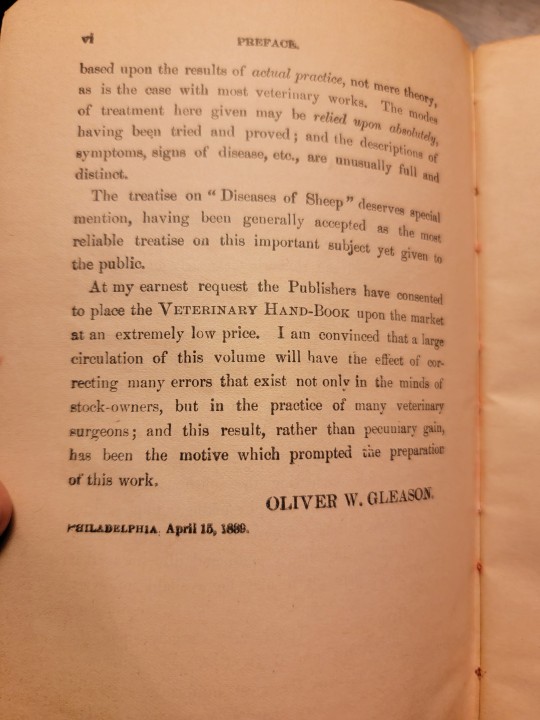
Published in 1900 in Chicago (I know the preface says Philly, but the publishing info says otherwise), love how it immediately begins with some shade.
If you are a fan of the All Creatures Great & Small books, you will recall similar shade at the "dark ages" of veterinary science. We're in an interesting transitional phase in this volume -- stuff like penicillin is still a ways off.


This is set up largely like a glossary. I wish there were more illustrations, but it's still fun to flip through and tempting to reference if I write any All Creatures fics set before the show begins.
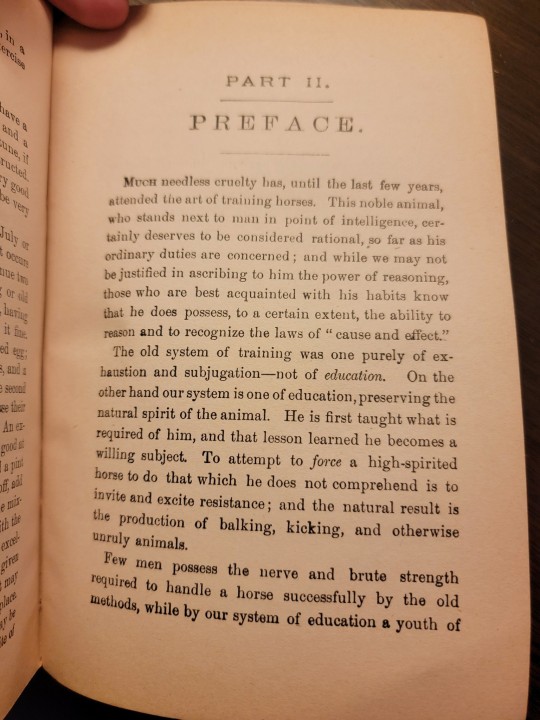
Did Siegfried Farnon write this?
As an aside, this paperback is in stellar condition (aside from the spine), whilst any pulp printed after 2010 is absolute gobshite. Paper quality has gotten so bad, even just in my lifetime. I can't tell exactly when this was published - all other copies I have found have been hardback and the paperback seems odd. Still a fun bit of veterinary science history.
I find old manuals like this fascinating. I have my eye on a beekeeping one next...
#antique books#acgas#all creatures great and small#well acgas adjacent but I think y'all would like this#veterinary science
74 notes
·
View notes
Text

Harris (@beetlemoses)
56 notes
·
View notes
Text
being a fantasy author with an veterinary science background is sometimes really awesome, but sometimes you're forced to consider super cursed concepts like: can dragons drop their tails like some other reptile species?
I decided no because they're such large creatures with such thick tails that the blood supply to the tail would be too massive and dropping the tail would lead to catastrophic blood loss. There ARE some larger lizards that can drop their tails under extreme circumstances, but it’s super risky and dangerous
#author#writer#writing#creative writing#fantasy#fantasy author#dragons#veterinary science#animal science#fantasy animal science#fantasy herpetology#herpetology#writeblr#chronically ill author#disabled author#fantasy science#dragon anatomy#blood tw#cw blood#injury cw#injury tw#injury#2026 fantasy debut#Child of the Dragon
43 notes
·
View notes
Text
Do like cats and dogs find us cute they way we find them cute?
Do like find human children/babies/infants adorable the way we find their babies adorable?
Or I'm is that not really something they can understand?
Because I know that it is said that cats see their humans as just weird cats that are bad at being cats and dogs see their humans as the head of the pack. (I think that is correct I might be wrong)
So I'm curious if like from the scientific/veterinary science understanding if they have a concept of cute/adorable and if so do they, cats and dogs, ever apply to humans and human children/babies.
24 notes
·
View notes
Text
I have a quick question for the scientists of tumblr.
I've seen on Facebook that a non-thesis based master's can kill your chances of ever going into research. Is this really true? The only programs I got into are non-thesis based, and I'm not feeling well enough for an actual job.
My end goal is a PhD so I don't want this degree to limit my prospects
#sciblr#the science side of tumblr#marine biology#veterinary science#phd#ms#dvm#scientist#women in stem#wildlife biology#graduate school#university#gradblr#college#grad school#advice needed
8 notes
·
View notes
Text
Wanna see some extracted horse teeth?
Under the cut just in case you don't.
I have to soak these in a bleach solution yet before I store them for display, but here are Beau's extracted teeth. Some of the marks are from the vet's drill, but the weird "fuzzy" look on the roots are signs of the tooth being broken down and being reabsorbed. I didn't see Beau's X-rays, but I did look up some online, and the EORTH X-rays I saw look like the roots actually look like they get bigger and feather out almost, which causes pain and displacement of the teeth.
His molars were more from cavities/rotting, and you can see one has barely any roots compared to the other. It was basically dead in his mouth.
The one canine that is broken had been going bad and building an abscess, which is one of the reasons it broke on extraction.
I plan to just keep these in a jar for now, lol. I don't have a little cabinet of curiosities but I should get one for stuff like this and the rock I found on the North Shore that looks like the state of Minnesota. Eventually, I might have one or two of the teeth made into jewelry of some sort, maybe hung on a horse hair braid.
I hope to have a few more solid years with Beau, but I do sometimes think about what I will do to memorialize his passing. Perhaps morbid, but the truth is an inevitably.
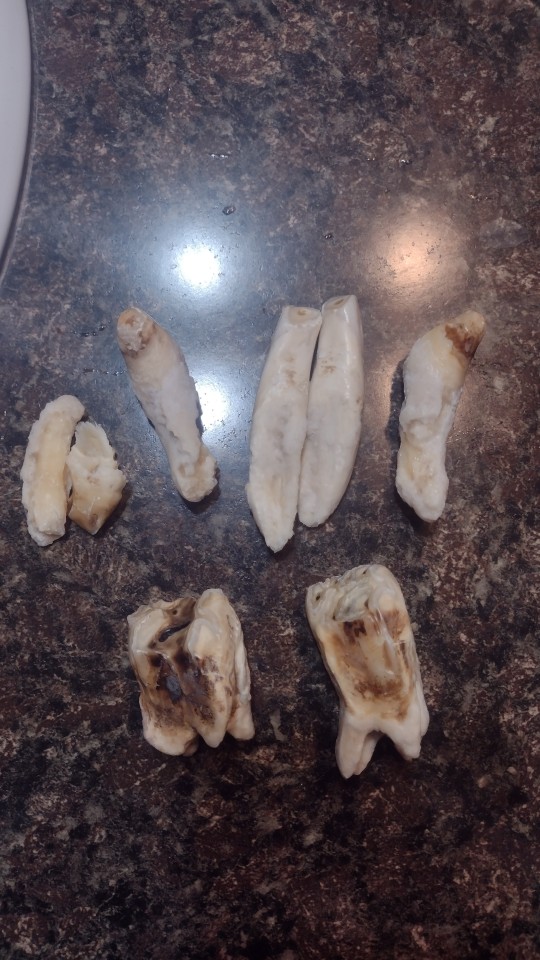

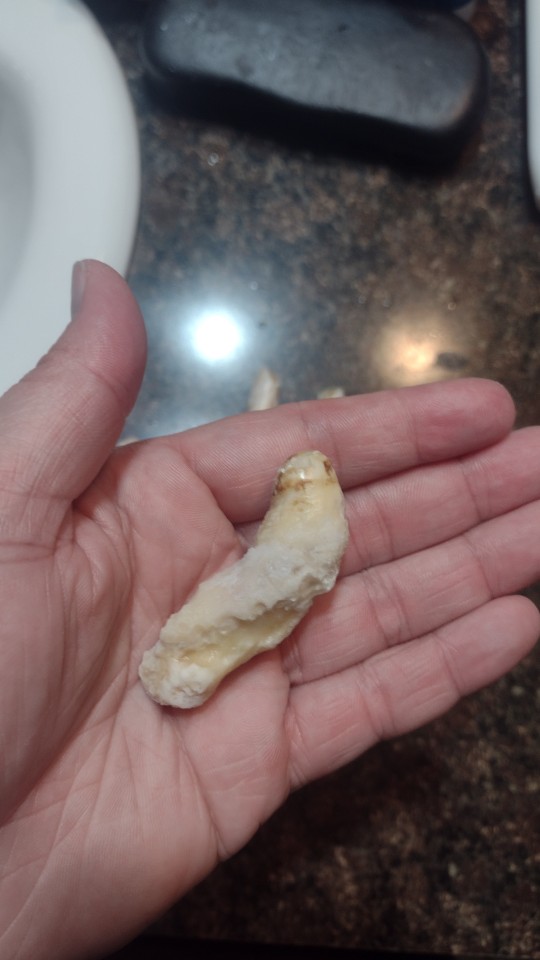

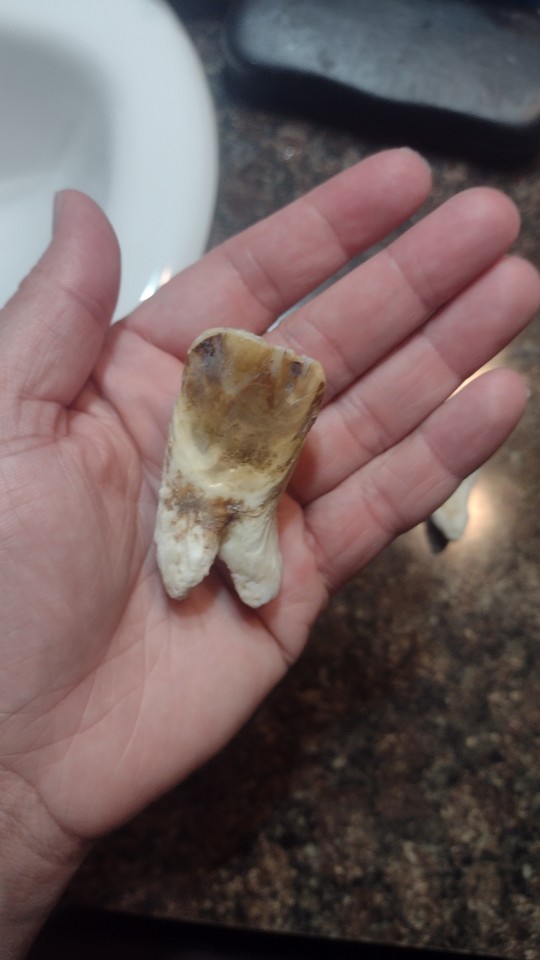
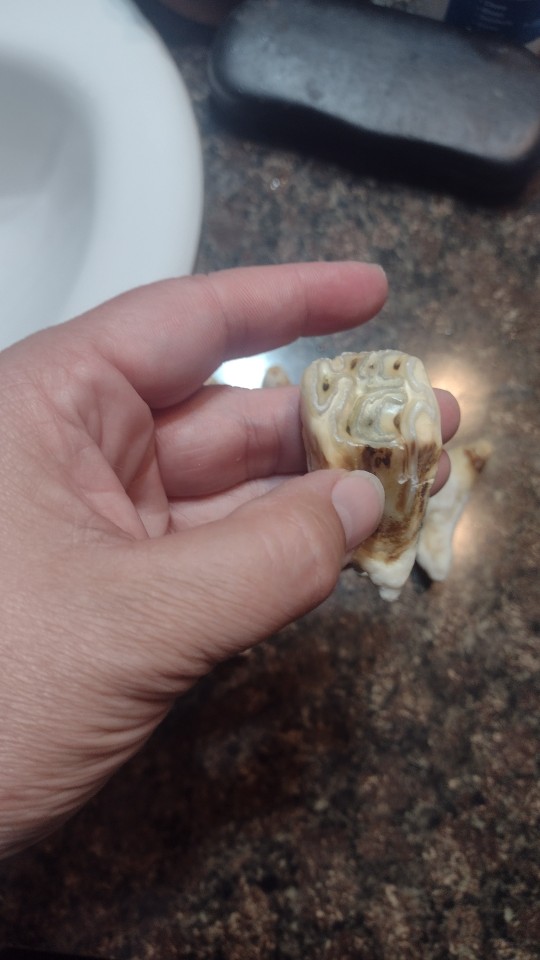
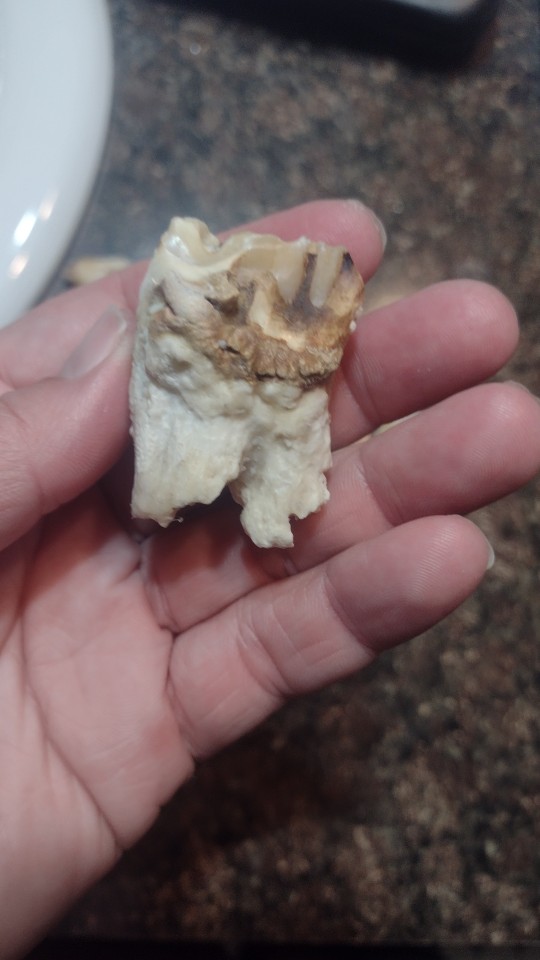

9 notes
·
View notes
Text




Fully into one of the hardest weeks of this internship, but managing so far, and also sort of having fun! 😅
#studyspo#studyblr#medblr#medspo#bujo#vetblr#vetmed#veterinary medicine#veterinary science#med school#light academia#academia aesthetic#ipad#goodnotes#studying#uni#thesis#studyblr community#light aesthetic#STEM#women in STEM#jan 2024
299 notes
·
View notes
Text
We need to move away from "this new study says this so do this" onto "the consensus from this body which represents this scientific area is this".
There's new studies coming out every second of every day. Yes they might change current perspectives and bring new information, but the study also needs time to be in the field and scrutinised (and also sometimes replicated) before It's established as a new body of evidence.
Influencers coming out with new studies all the time makes it sound like science changes at the drop of a hat and it doesn't. It needs thoughtful consideration and that comes from the relevant scientific body that represents that area.
In my mind this is one of the biggest threats to scientific reputation in the near future and influencers wanting their 30 seconds of fame and to be the one to shock and scare everyone for engagement is going to be our biggest downfall.
We all need to slow down and look for the overall consensus and stop cherry picking studies for engagement.
28 notes
·
View notes
Text
alright nerds--
*tried to fit as many options as possible. (wildlife-focused fields were done on another poll)
#studyblr#polls#tumblr polls#studyblr polls#academia#academics#college#careers#animal science#veterinary medicine#vet med#veterinary science#animals#wildlife#zoology#marine biology#marine life#biology#bio#conservation#ecology#pathology#surgery#rehabilitation#animal behavior#agriculture#animal medicine#animal care#exotic animals#veterinary
21 notes
·
View notes
Text
I'm back on Tumblr and need to follow some blogs! 😁
Please give me a like/reblog if you are/post any of the following and I will follow you :)
- 60s, 70s, 80s music, maybe some 90s music
- 80s hair metal, glam metal, glam rock, etc.
- Fleetwood Mac 💚
- Symphonic metal(Epica, Nightwish, etc.)
- Evanescence, Within Temptation, Amaranthe, Delain, any similar bands
- Helloween (the band)
- Halloween (the spooky time 🎃)
- Studyblrs: Veterinary, Music, Literature, Astronomy/physics, History
- Artists and writers with OCs that are musicians, or OCs whose stories are set in historical periods(anywhere from 1800-1990s, but my favorites are 1800s, 1910s, 1960s, 1970s, 1980s, 1990s, and up to 2008)
- Titanic 💙 both the movie and the history
- Some more bands: Bon Jovi, Def Leppard, Whitesnake, Van Halen, Mötley Crüe, Aerosmith, Poison, Dokken, RATT, etc. 🎸
#evanescence#80s#glam metal#bon jovi#Halloween#def leppard#jon bon jovi#whitesnake#hair metal#studyblr#music studyblr#physics#astronomy#80s music#symphonic metal#epica#nightwish#delain#within temptation#helloween#motley crue#vet studyblr#veterinary studyblr#veterinary#veterinary science#music#study notes#study motivation
19 notes
·
View notes
Text

Fascioloides magna
#fascioloides magna#nature#liver flukes#trematodes#wikipedia#wikipedia pictures#animals#platyhelminthes#trematoda#plagiorchiida#fasciolidae#fascioloides#giant liver fluke#large american liver fluke#deer fluke#liver butterflies#parasites#parasitology#animal parasites#digenean trematode#veterinary medicine#veterinary science#vet med#medicalcore
22 notes
·
View notes
Text
the only valid french people are the french parasitologists because look what they named this recently discovered parasite:
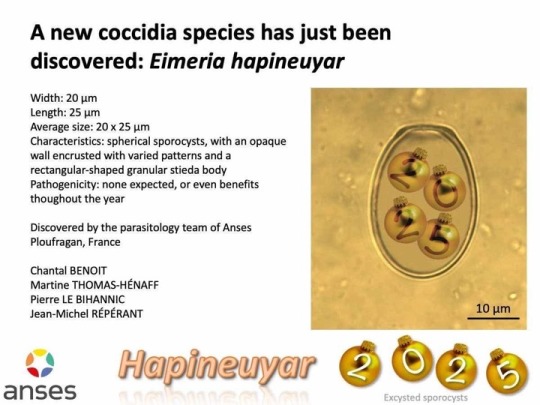
Hapi Neu Yar everyone
8 notes
·
View notes
Text

https://www.fogaminghub.com/post/unleash-the-fun-planet-zoo-zookeepers-animal-pack-launching-oct-15
🌟 Exciting news, Zookeepers! The Planet Zoo Zookeepers Animal Pack is set to launch on October 15th, just in time for our 5th anniversary! 🎉 Featuring 7 highly requested animals, plus more than 95 stunning scenery pieces, this pack is a must-have for all Planet Zoo fans! 🐾 Join the fun with a brand-new campaign scenario and don’t forget the FREE update with the African Leopard! Let’s make this celebration unforgettable! 🦁🎈
#Planet Zoo#Zookeepers Animal Pack#Animal Pack Launch#Planet Zoo Celebration#Zoo Game#Animal Lovers#New Animals#Video Game News#Zoo Simulation#Gamer Community#Animal Conservation#Gaming Updates#Wildlife Experience#Veterinary Science#5th Anniversary#Community Challenge#Game Update#Planet Zoo Console#Gaming Features#PC Gaming#Console Gaming#Interactive Wildlife#Zoos Of The World#Animal Behavior#Scenery Enhancements#Creative Parks#Animal Welfare#Hayo Zookeepers#Pet Sims#Gamer Celebration
9 notes
·
View notes